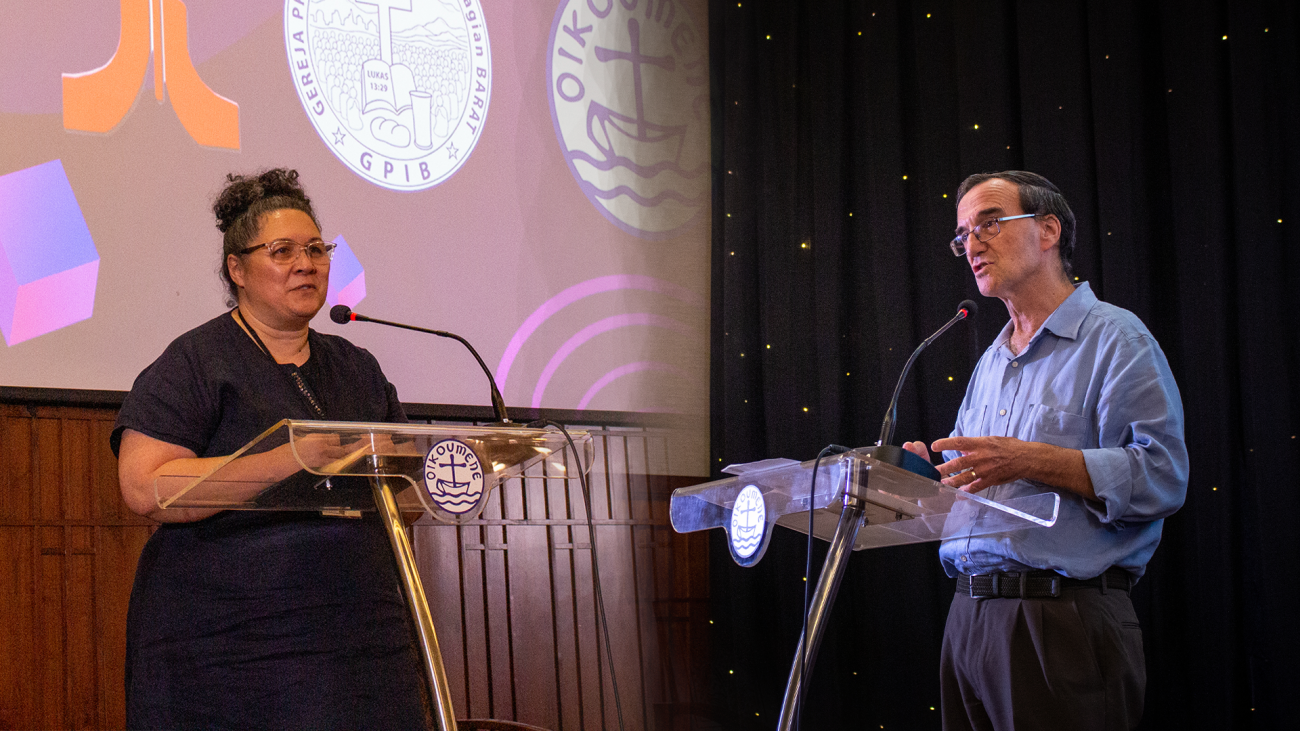Asia’s ecclesial and ecumenical leaders explore possibilities of introducing consensus decision-making

Rev. Tara Tautari (Methodist Church of New Zealand) and Rev. Terence Corkin (Uniting Church in Australia) share models, practices, and opportunities of consensus decision-making for the ecumenical movement in Asia at the ACELC
Jakarta, Indonesia: At the Asian Church and Ecumenical Leaders’ Conference (ACELC), organised by the Christian Conference of Asia (CCA), over one hundred Asian church and ecumenical leaders discussed the possibilities and challenges of introducing consensus decision-making as a procedural methodology in CCA’s governing bodies as well as in Asian churches and ecumenical councils.
Two sessions on the third day of the ACELC dealt with the chosen topics, which were ‘Consensus Decision-Making: Models and Practices’ and ‘Consensus Decision-Making: Prospects and Challenges for Implementation’ and introduced the value of consensus decision-making processes.
Rev. Terence Corkin of the Uniting Church in Australia who facilitated the session on the models and practices of consensus decision-making said, “Consensus describes the process and the outcome. It is more than a business process and reflects a way of being, a way of community. Through this method, we make decisions and deeply explore the nuances of issues at hand.”
“Consensus decision-making is a culture-changing practice in the life of those churches who take it seriously. Communities that use and are committed to the values of consensus turn from competitors to collaborators, from debaters to listeners. It is a method that assumes we will make certain commitments with each other and behave in ways that reflect discernment,” shared the Australian minister, who is also an expert in mediation practice.
Rev. Corkin shared the stages of progressive development and documentation for building consensus and the supportive practices to enhance the process of consensus decision-making.
Rev. Asir Ebenezer from the National Council of Churches in India raised the challenge of the nomenclature of ‘conflict’ vs. ‘consensus’, which had negative and positive value connotations. Consensus in some contexts, said Rev. Ebenezer, when projected as the norm, absorbs dissenting voices into the majority.
Rev. Dr Mery Kolimon from the Protestant Evangelical Church in Timor asked how the voices of women, youth, and other vulnerable groups could be represented in the decision-making process.
The session was moderated by Bishop Dhiloraj Canagasabey from the Church of Ceylon.
The ‘Consensus Decision-Making: Prospects and Challenges for Implementation’ session was conducted by Rev. Tara Tautari, the General Secretary of the Methodist Church in Aotearoa New Zealand.
The session spurred lively and engaging discussions on three key questions—what are the primary challenges for implementing consensus decision-making; what are the primary opportunities that consensus decision-making offers; and what might church leaders need to give up to make consensus decision-making work.
Responses from the floor included comments on the following: the space for multiple perspectives, ensuring that the voices of minorities are heard, ensuring that indigenous decision-making practices are respected, the need for translation and interpretation services, being open to receiving criticism, and being prepared both mentally and spiritually so as to not lose the prophetic voice amidst the gathering.
Dr Mathews George Chunakara, the General Secretary of the CCA stated that the aim of introducing the consensus decision-making model in CCA was to initiate the process to be implemented first in CCA, and subsequently in CCA member churches and national ecumenical councils.
Ms Minnie Anne M. Calub from the National Council of Churches in the Philippines moderated the second session.
The two sessions were organised at the headquarters of the Persekutuan Gereja-gereja di Indonesia, (PGI) or, as translated into English, the Communion of Churches in Indonesia, which is the national council of churches, comprising 96 member churches across Indonesia.
The week-long high-level summit is also discussing strategies and models of good governance and integrity leadership in Asian churches.
More photos can be found here.










